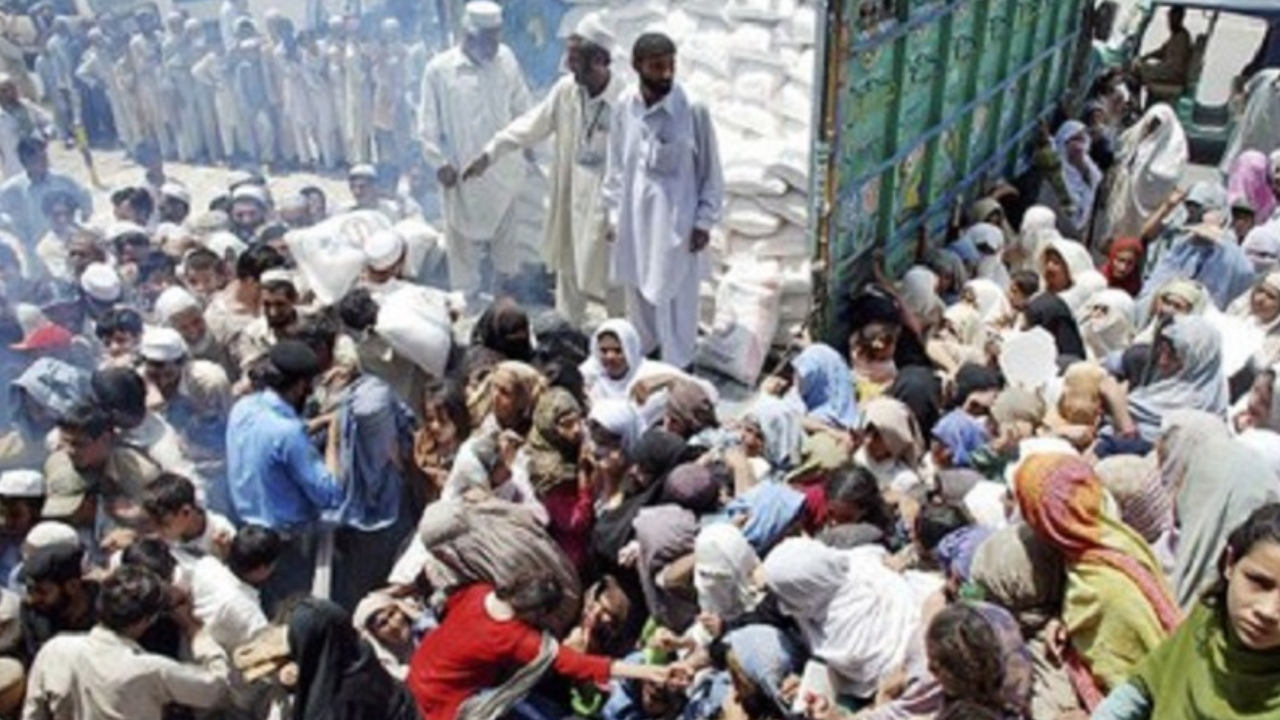The army, which has ruled the coup-prone country for more than half of its 75-plus years of existence, has hitherto wielded considerable power in matters of security and foreign policy.This foray into economy and agriculture has raised several eyebrows.
In grips of food crisis
In the 2023 Global Hunger Index, the country ranked 102 out of 125 nations, with its hunger categorised as ‘serious’. Pakistan currently faces a scenario in which it is largely food sufficient but not food secure.
Racked by record-breaking inflation and soaring poverty, the desperate masses frequently gather by the thousands at government distribution centres to get free flour. There have also been several instances over the past few months when the gatherings devolved into stampedes, resulting in dozens of casualties.
Army takes central role
In an attempt to improve the situation and restore its image in the eyes of the public — which took a beating after repeated attacks by ousted PM Imran Khan — the army has taken centerstage in attempts to alleviate food insecurity.
Over the past six months the military leadership has played a key role in trying to stabilise the country’s ailing economy.
Pakistan army chief General Asim Munir is a member of the country’s Special Investment Facilitation Council, which was established in June as a paramount decision-making platform aimed at spearheading essential structural reforms within the economy.
Barren land
In an effort to rapidly make Pakistan self-sufficient in food production, the caretake government has agreed to hand over hundreds of thousands of acres of land to the army for cultivation.
In September, a deal was reached to give the army a 30-year lease on over 400,000 hectares of land — an area triple the size of Delhi — in Pakistan Punjab.
Earlier this month, another similar pact was signed that will see the army cultivate over 17,000 hectares of land in restive South Waziristan, Khyber Pakhtunkhwa province.
What has raised eyebrows is that the land taken by the army in South Waziristan is a rugged terrain with complex hills and ridges that witness hot summers and extremely cold winters. There is also no irrigation system and no mass cultivation has been done in the area.
“Initially, the army will farm 1,000 acres of land and then expand to 41,000 acres (17,000 hectares) in South Waziristan’s Zarmalam area – which was barren for years – in a bid to enhance agricultural productivity of the region and promote food self-sufficiency,” The News International reported.
The area is also located close to the Afghanistan border and has seen a spike in terrorists attacks, particularly targeting army personnel.
Terrorist activity in the area has been increasing ever since the Taliban stormed back to power in Kabul in August 2021.
In Punjab, most of the land given to the army is in the Cholistan Desert which is an arid region prone to water shortages. The area also lacks an irrigation system.
Short on details
Critics told Nikkei Asia that the latest transfer could cement Pakistan’s military as the country’s single-biggest landowner.
“The job of the army is to protect against external threats and come to the aid of the civilian government when requested to do so. Nothing more, nothing less,” Rafay Alam, an environmental lawyer, told Nikkei Asia.
There is also very little transparency regarding how or when the army aims to operationalise these farms.
While most media reports agree that the army will “play a role at the management level” to make the project a success story and that the ownership of the land will continue to stay with the provincial government, there is confusion over who will get the profits.
“The military will not get any profit or share in the revenue to be mopped from corporate agriculture farming,” said a Geo News report.
However, a Nikkei Asia report citing leaked government documents said around 20% of the profit generated from selling the crops will be earmarked for farming research and development, and the rest will be divided equally between the army and state government.
Those backing the plan have promised that it will generate better crop yields and save water. Something that Pakistan desperately needs amid depleting foreign exchange reserves and rising commodity prices.
But many have raised concerns that the military, which is already a powerful entity, could gain massive profits from the food-security push and further deprive Pakistan’s 25 million rural landless poor.
